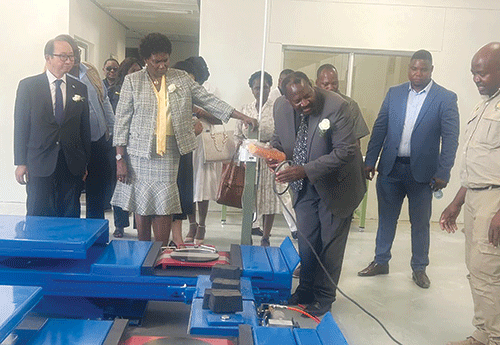KATIMA MULILO - Higher education minister Itah Kandjii-Murangi has emphasised the need for higher education institutions to offer priority courses beyond level 3 to produce artisans to drive green energy development in Namibia.
She made the remarks during the inauguration of workshops and handover of equipment to the Zambezi vocational training centre in Katima Mulilo on Friday.
She said technical and vocational education and training (TVET) is an imperative for Namibia’s industrialisation and
overall development, which heavily relies on the development of a skilled workforce to drive innovation and contribute to economic diversification.
Equally, TVET is crucial, for it equips individuals with skillsets that enable them to cope in a rapidly- evolving world.
“The areas of oil and gas as well as green hydrogen need artisans. There is a need for the availability of TVET graduates. A good, significant number of trades - we don’t offer them. It’s imperative that we start offering them and not ending up to level 3, but end up to level 5 or 6. We need to position ourselves to introduce programmes aligned to new emerging industries without interfering in the already-existing priority fields,” she urged.
In giving effect to Namibia’s own aspirations as a modern economy,
the Namibian government has embarked on a focused pursuit to
stake its future as a Green Hydrogen hub. Hence, the politician believes that with the abundant wind and sun, Namibia has the potential to be one of Africa’s first green energy export powerhouses.
Also, in recent years, the discoveries of oil and gas in Namibia have placed yet another pressing need for specialised professional and technical skillsets, unique to this sector. “Highly-skilled Namibian artisans, technicians and technologists are required for the construction of plants and for the installation of equipment. They will have to ensure that plants are assembled and maintained according to specifications. In these categories, a wide range of vocations are required. These include electricians, plumbers, welders, drilling technicians, construction specialists, manufacturing process operators, wind farm and solar electricity technicians, photovoltaic module installers, logistics operators, automation and control technicians, chemical laboratory assistants and others,” she emphasised.
The minister gave the assurance that the Namibian tertiary education system is being repositioned to be adaptive and to directly respond to the needs and demands of these new emerging priority fields of study, without being disruptive to already ongoing prioritised fields.
Kandjii-Murangi said what is increasingly becoming evident is the importance of programmes and trades articulation, defined entry requirements based on acquired levels of competencies, knowledge sophistication, application, versatility and the ability to harness appropriate modern technologies. “Our public higher education and training institutions are directed to expand access through the maximum use of their MoUs with other institutions globally. Staff upskilling and/or retraining are prioritised,” she noted. Zambezi governor Lawrence Sampofu agreed that parents should send their children to vocational training centres, saying it’s the way to go for any nation to industrialise.
The gathering had two events, namely the inauguration of new workshops and other training support infrastructure, and secondly, the handover of the state-of-the-art training equipment to make the new training facilities operational. The equipment and new workshops form part of the development assistance by the Japanese government to the tune of over N$50 million towards vocational training and education in Namibia. The minister added that a responsive and industry-relevant TVET sector also stands central in overturning Namibia’s unemployment challenge, which is one of the biggest stumbling blocks towards expanding and modernising the economy. “The impact of unemployment
and under-employment in a highlysegmented labour market, like our own, impedes economic growth,” she observed.
Ambassador of Japan to Namibia, Hisao Nishimaki, said the assistance is from the Japanese Government under its Economic and Development Programme to the government of Namibia, which they penned in September 2020.
“Today, we stand here to witness the coming together of the work done by the government of Namibia to expand the Zambezi Vocational Training Centre by constructing these various infrastructures being inaugurated today, and the complementary training equipment provided by the government of Japan to the tune of approximately N$50 million,” he stated.
Nishimaki said it is evident that the government of Japan puts major emphasis on
local skills’ development, and resourcing institutions of higher education with the right infrastructure and new equipment. This, he believes, will go a long way in ensuring the sustainable production of graduates at the same time. Both governments are optimistic that the equipment support will optimally merge with the Zambezi Vocational Training Centre’s vision of becoming a reputable vocational training provider, developing competent citizens to contribute to the socio-economic prosperity and wellbeing of Namibia and indeed the region.
On behalf of the Namibian government, Kandjii-Murangi extended profound appreciation to the government of Japan for the sustained support to Namibia’s TVET sector.
“Japan’s commitment to invest in our TVET sector is commendable. This demonstrates a shared belief in the power of education and training to transform lives. Japan’s support symbolises the enduring friendship and collaboration between our two nations,” she added joyfully. Nishimaki reaffirmed Japan’s commitment to providing technical assistance and other needs to Namibia, especially in the fields of education, health and agriculture, to uplift the livelihoods of Namibian people.
- anakale@nepc.com.na


